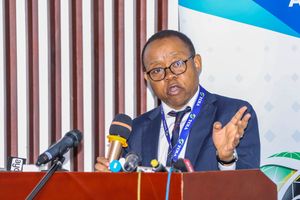Prime
Tanzania advocates oppose ‘forced’ EALS membership

What you need to know:
- The lawyers initially filled an application challenging TLS resolution that its members to the East African Law Society (EALS), as pre-condition to abstaining practicing licence.
Dar es Salaam. Three lawyers have gone to the Court of Appeal to challenge High Court’s decision to strike out their application that sought to quash a resolution by the Tanganyika Law Society (TLS) compelling its members to join the East African Law Society (EALS).
TLS passed at its May 28, 2022 AGM, a resolution that its members have to join the EALS as a pre-condition to obtaining a licence to practice law.
The trio---Mr Hekima Mwasipu, Frank Chundu and Deogratias Mahinyila---argue that the TLS has no legal mandate to compel its members to join or subscribe to such organisations without consent of individual members of the TLS.
Recently, Judge Moses Mzuna upheld preliminary objections raised by TLS, EALS and the Attorney General (AG) that the application was prematurely brought at the High Court (main registry), Dar es Salaam.
But the lawyers told The Citizen they have already notified the Court of Appeal of their intention to challenge the High Court’s ruling.
“Basically, we are going to lodge an appeal. Already we have filed a notice of intention to appeal, we feel that the judge made some errors in his ruling,” Mr Mwasipu told The Citizen on phone.
Specifically, the trio wanted the court to quash the TLS (Annual Subscription) Regulations, Government Notice No 600 of October 14, 2022 made by the governing council of the TLS and gazetted by the AG, making the EALS membership fee mandatory conditions for renewal of advocates practicing certificates.
They sought orders seeking to challenge the TLS AGM resolution imposing compulsory membership to of the EALS to all individual members of the TLS.
The applicants were represented by advocates Edson Kilatu, Selemani Mtauka and Ferdinand Makore. Mr Fransic Stolla and Alex Mgongolwa represented TLS while Mr Moses Mahuna, Ms Gigi Maajar and Jovinson Kagirwa appeared for the EALS. The AG was represented by state attorney, Mr Erigh Rumisha.
However, before the application went to a full hearing, the respondents---TLS, EALS and the AG raised six points of preliminary objections and sought dismissal of the application.
Advocates Alex Mgongolwa and Francis Stolla argued that the applicants failed to exhaust internal remedied within TLS before filing the application.
“If they were aggrieved by the resolution, they ought to have presented a motion. Since there is no proof of exhaustion of internal remedies, the application is premature. It should be dismissed,” argued Mr Stolla.
The application strongly opposed the objection, arguing that there were no other internal remedies within TLS because the Regulations on the payment of EALS membership fees had already been published, thus barring them from challenging the resolution.
On the other hand, Mr Stolla and colleague further argued that the application was time barred as it was filed after the expiration of six months from when the alleged TLS resolution was passed on May 28, 2022.
Application struck out
In his ruling, Judge Mzuna sided with lawyers for respondents who argued that the applicants failed to use section 25 of the TLS Act, which prescribes the manner in which resolution can be altered or rescinded.
“The applicants have dispensed with this remedy and instead filed this application prematurely. The argument that upon publication of the G.N that options dispensed with is unjustified,” said the judge.
The judge also agreed with the respondents that the application by the applicants was filed out of time---after the expiration of six months from when the alleged resolution was passed by members of the TLS on May 28, 2022.
“The challenging of the resolution was prematurely filed before this court as the time set out under Rule 6 had not lapsed. They ought to have exhausted other available internal remedies in the TLS Act, before recourse to this court,” said the judge.



